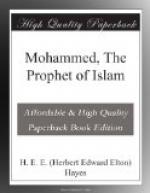In studying the life of Mohammed, the cause of his failure to uplift humanity will be clearly seen. His early sincerity, if sincerity it can be named, was absorbed by his consuming ambition. Had it been otherwise he might have had his name inscribed with the honourable ones of the earth—those men whose claims are ratified by their happy effects. As it is, his name is linked with those whose deeds cause a shudder of horror and repulsion to all who love honesty, purity, and truth.
I.—EARLY LIFE.
Mohammed was born in Mecca, a town in Arabia, about seventy miles inland from the Red Sea. His father, who died 570 A.D., a few months before the child was born, was a member of the Banu Hashim clan. His family, although well connected, was a humble one, possessing but little wealth. On the death of his mother some six years later, the child was taken by his grandfather, ’ABD-El-MUTTALIB, who took care of him for two years. Then he was adopted by his uncle, Abu Talib, who employed him to look after his flocks and herds.
From his earliest years, Mohammed must have been brought into contact with the religious life of Mecca, for his grandfather was custodian of the Kaaba, or temple, and would frequently take the boy with him on his official visits to the place. The numerous images of the gods set up in the temple would be familiar objects to the future prophet, whose iconoclastic zeal was eventually to bring about their destruction. His lonely shepherd life favoured the cultivation of the contemplative habits of his manhood, and played no unimportant part in the development of those characteristics which eminently fitted him for the life he was to lead. Nature had endowed him with the essential abilities of a commander of men, and his early environment provided a training that enabled him to exercise those gifts most advantageously.
The population of Arabia at this time consisted of numerous independent nomadic tribes, who were often at enmity one with another. Political unity there was none, while each tribe had its own patron, or god, which was considered to be responsible for everything concerning the tribe’s welfare. Where tribes were united, or at peace, there the individual gods were supposed to be friendly. Even in Mecca, which for many years had been occupied by a settled community, there was no political or judicial organisation. The existing order was maintained by a form of patriarchal government, under which system it was possible for the head of a tribe or clan, to protect the life of any individual he chose to befriend.




